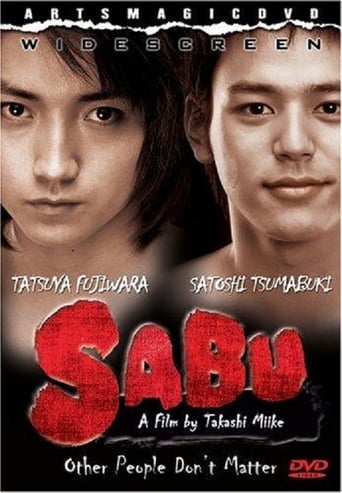

You know, not only have I never seen a Takashi Miike movie quite like this, in some ways this movie is different than any other Japanese movie I've ever seen as well. It shares conceits closer to Mexican cinema and melodrama than Japanese drama styles and Miike's themes. And of course, still, it is a very Miike movie.Because of the fast and continual production of his oeuvre, Takashi Miike films can sometimes look like the cheaply produced videos they are and have a very thrown-together editing, but that has never been a problem for him because his style and sensibilities have vastly outweighed his production values, like any good independent and maverick filmmaker. Later movies of his look better and are better crafted, but this earlier work is noteworthy because he slows it down a bit and fills the story with gorgeous, every-frame's-a-still-picture-for-a-gallery imagery. From the opening shot of a hanging woman to the burning building to the closing, this movie is very visually pleasant to watch.It's also a somewhat strange story. Sabu is a young man tortured with guilt and grief for his friend Eiji, who was sent to a worker's jail after being framed for stealing gold cloth. Eiji is much more patient and in control, planning his vengeance as he fights off the low-lifes in the jail and protects the weaker inmates. What's interesting about that is that the title character is actually incredibly melodramatic and inactive, which is not typical in most narratives. Eiji, the more dynamic and interesting character, would be a much more appropriate name for the movie; Sabu is more a supporter.Still, Miike isn't one to get caught up on narrative theory, preferring instead to take it where he may. This is actually a much more sober and patient Miike than many of his fans may be used to, but still contains his trademark violence and style--only now the "excesses" are put into the cinematography and background instead of the action. Another good film by another continually amazing auteur.--PolarisDiB
... View MoreTakashi Miike has directed some very, very unusual films. Some have been hilariously strange and off-beat (HAPPINESS OF THE KATAKURIS), just plain odd (BIRD PEOPLE IN CHINA) or super violent (AUDITION and ICHI THE KILLER). As for me, I have loved some of his films but also found his violent films so sick and graphic I couldn't stand them--it's all a matter of taste--I just don't want graphic violence in my films. But, I wasn't at all prepared for SABU, as it seemed nothing like the other Miike films I'd seen. I was worried it would be too violent (it wasn't unnecessarily so) and hoped it would be weird and unconventional (it wasn't). Overall, it was a finely crafted but extremely conventional film about a man who is unjustly sent to debtors prison and becomes violent in order to cope with it--and praying for revenge when he one day is released. As far as this plot goes, it has some very interesting elements and twists (particularly towards the end), but the film also is a bit dull in spots and I was tempted several times to stop watching. While I am glad I stuck with it because there was enough payoff at the end to justify seeing it, it wasn't a particularly interesting film or anything that seemed out of the ordinary. I'm sure Miike's rabid fans out there would thoroughly disagree, but I think the ordinary viewer could take or leave this film.
... View MoreAs mentioned in another review, this film should probably have been called "Eiji", because he is certainly the focus of attention. The slight plot revolves around a perceived injustice against him and its eventual resolution. The supporting cast are more sketches than characters, but the narrative survives the demands of this televisual simplification.As a historical document it's beautiful. Perhaps Miike wanted to show, much like Kurosawa, that even in the era of the Samurai, ordinary people also led lives tinged with drama. I felt that there was a hint of predetermined running time (perhaps two one hour episodes?) which led to a bit of a lull in proceedings around the hour mark. I resolved my putative ennui by resorting to the time honoured British tea ceremony. By the time I'd finished my refreshments, the plot had picked up again, and fortified by some quality tiffin, I thoroughly enjoyed the denouement. I'd guess that this is the Japanese equivalent of those great period dramas that the BBC excels at. I don't watch television, but I would if it could consistently offer a dramatic emotional diet as rich as this.
... View MoreComing from the prolifically warped Takashi Miike, this is a surprisingly straightforward psychological period drama. As witnessed and protected by his self-effacing best friend Sabu (Satoshi Tsumabuki), pretty boy Eiji (Tatsuya Fujiwara) receives proper comeuppance for his arrogance through being wrongfully accused and punished for a crime inspired by his allure. The bootleg U.S. DVD by Ctenosaur is a work of love. Highly recommended.
... View More